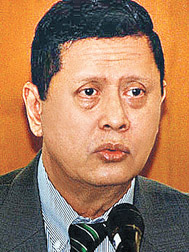The many personalities of ‘Kiki’ Darusman
by Prof Rajiva Wijesinha
One of the more astonishing features of the Darusman Panel is the
character of its chairman. I have in fact met him, for he has
participated in workshops organised by the Council for Asian Liberals
and Democrats, which I now chair. He was, I think, Attorney General of
Indonesia in those days, serving in the government of President
Abdurrahman Wahid, who subsequently became an individual member of CALD.
 |
|
Marzuki Darusman |
What I did not know then, and only found out recently was that Mr
Darusman had previously been a member of the Golkar Party of President
Suharto. In 1999 he was Co-Chairman of that Party and also Chairman of
the Indonesian National Commission for Human Rights.
In that year the BBC wrote as follows about the fact that alleged
atrocities by pro-Indonesian militias in East Timor are set to be
investigated by an international commission, after the United Nations’
main human rights body voted in favour of an inquiry - The UN Human
Rights Commission meeting in Geneva on Monday passed the EU-sponsored
plan despite Indonesian Opposition.
Indonesia has said it will not co-operate with the international
investigation. It says its own inquiry led by the Indonesian National
Commission on Human Rights (Komnas) is sufficient. Other Asian countries
also opposed the plan, arguing that Jakarta had shown good faith in
allowing international forces into the territory.
The head of Komnas and co-chairman of the ruling Golkar party,
Marzuki Darusman, told the BBC that the vote was “a setback for the
Indonesian Government”. But he said “we will just have to accept it.”
However, he added that the move could deepen nationalist sentiment
amongst the Indonesian public “against the perceived intrusion of
outside interests.” Clearly Darusman’s worldview has changed since then.
Perhaps he has been converted to a more expansive view of rights, or
perhaps it is simply that, having no longer found it possible to hold on
to office in Indonesia by changing parties or otherwise, he now serves
less demanding taskmasters.
While he was Attorney General he was certainly challenged by his
past. In 2000, the Delhi based Human Rights Features wrote about a
report the Indonesian National Human Rights Commission presented to
President Wahid of its special investigation into Tanjung Priok - one of
the worst tragedies under Suharto’s reign. The article pointed out that
Recommending only further investigations, the report fails to call for
trials to proceed against the senior military officials who had command
responsibility over the armed forces involved.
According to reliable sources, the official now charged with
following up the investigation is Attorney General Mr. Marzuki Darusman,
who, in his previous job as Chair of the KOMNAS HAM (the Indonesian
Human Rights Commission), strongly resisted the Commission’s involvement
in this case.
Thus the question remains whether, as Attorney General, Mr. Darusman
will now vigorously pursue those responsible for the Tanjung Priok
murders and torture - no matter how far up the chain of command - or
whether he will try to rely on the Commission’s initial inadequate
inquiry to claim that insufficient evidence exists to bring the
perpetrators to justice.
I have no idea what Mr Darusman did then, or which particular
principles he was following at that stage. That he changes his
principles regularly is apparent from a report on another case
investigated by KOMNAS when he was its chair.
That Report, written in 1997 by an Indonesian organisation called
‘Analisa & Peristiwa’, was quite cynical about Komnas’ conclusion that a
‘Third Party’ was involved in what was described as the ‘Taskmalaya
Chaos’ For example, Komnas could not mention the exact number of
victims. When the reporters asked why Komnas did not announce the number
of victims and the total loss of the riot, Lopa answered, “Because on
the PDI case, Komnas HAM needed one to six months to check the numbers.
This time, we do not want to give unclear numbers. So, we are waiting
for more accurate numbers.”
Marzuki Darusman also mentioned that there was a strong indication of
a third party’s involvement. This Komnas leader expressed his wonder as
Tasikmalayans were known as polite, obedient and patient people.
How could such people suddenly go berserk? “In Tasikmalaya’s history,
the people have never being so mad as they were in the riot,” said Kiki
( Marzuki’s nickname). Moreover, as mentioned by Lopa, Marzuki also
stated the finding of street banners and leaflets which had been used to
influence Tasikmalayans to become involved in the riot.
It is touching that Kiki’s Komnas was so careful then about dealing
in precise numbers. Fourteen years later, transformed into a new man who
serves new causes, Kiki flings vast numbers around with abandon. I
suppose it is possible that people’s ethics and values change with the
years. But it must also be fun to enjoy a wonderful new career, looking
into first Benazir Bhutto’s assassination, and then the Sri Lankan
problem, for someone whose promising transitions in Indonesian politics
had come to an end.
|

